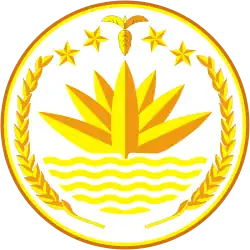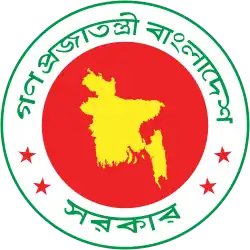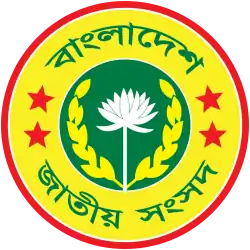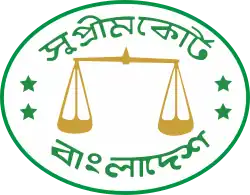1991 Bangladeshi presidential election
| ||||||||||||||
| ||||||||||||||
| ||||||||||||||
| This article is part of a series on the |
| Politics of Bangladesh |
|---|
 |
|
|
|
|
Indirect presidential elections were held in Bangladesh on 8 October 1991, with the 330 members of the Jatiya Sangsad electing the president.[1] This was the first indirect election after the restoration of the parliamentary system.[2][3] Abdur Rahman Biswas was nominated by the ruling Bangladesh Nationalist Party and Badrul Haider Chowdhury was nominated by the Awami League.
Abdur Rahman Biswas was elected with 172 votes to the 92 received by Badrul Haider Chowdhury. He took the oath of office and took office on 10 October 1991. This was the last contested presidential election in Bangladesh.[4][5][6]
Results
| Candidate | Party | Votes | % | |
|---|---|---|---|---|
| Abdur Rahman Biswas | Bangladesh Nationalist Party | 172 | 65.15 | |
| Badrul Haider Chowdhury | Awami League | 92 | 34.85 | |
| Total | 264 | 100.00 | ||
| Registered voters/turnout | 330 | – | ||
| Source: Daily Star[1] | ||||
References
- ^ a b "Reminiscence of a lost battle: Arguing for the revival of second schedule". The Daily Star. 6 November 2010.
- ^ Baxter, Craig (1992). "Bangladesh in 1991: A Parliamentary System". Asian Survey. 32 (2): 162–167. doi:10.2307/2645214. ISSN 0004-4687. JSTOR 2645214.
- ^ "The rise and fall and rise of politics". The Daily Star. 2009-08-07. Retrieved 2019-05-04.
- ^ "Former president Abdur Rahman Biswas dies". Dhaka Tribune. 2017-11-03. Retrieved 2019-05-04.
- ^ "Bangladesh - Presidential Election Act (Act No.27 of 1991)". International Labour Organisation. Retrieved 2019-05-18.
- ^ "যে প্রক্রিয়ায় রাষ্ট্রপতি নির্বাচন". Bangla Tribune (in Bengali). Retrieved 2025-02-22.


